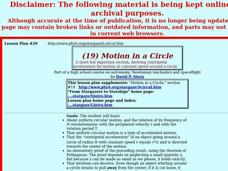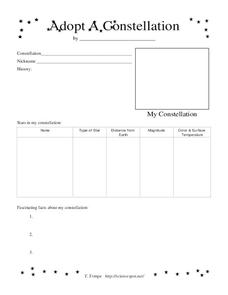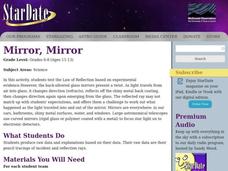Curated OER
NEWTON'S 3RD LAW
Young scholars examine the formal definition of Newton's 3rd law: "forces always originate in pairs, equal in magnitude and opposite in direction." --The informal, qualitative version: "Each action has an equal and opposite reaction."
Curated OER
MOTION IN A CIRCLE
Young scholars explore uniform circular motion, and the relation of its frequency of N revolutions/sec with the peripheral velocity v and with the rotation period T, and the "centripetal acceleration" of an object.
Curated OER
FRAMES OF REFERENCE: THE BASICS
Students examine the concept of frames of reference in physics: that two frames of reference, each moving with respect to the other with a constant velocity v, observe the same accelerations and therefore Newton's laws are the same in both.
Curated OER
THE MANY COLORS OF SUNLIGHT
Students examine rainbow components, spectral colors, colors perceived by the eye, hot solids, glowing rarefied gas, absorption, that light is a wave, and optics.
Curated OER
WAVES AND PHOTONS
Learners examine the many types of electromagnetic waves, the concept of an EM wave, how James Clerk Maxwell proposed a slight modification of the equations of electricity, Heinrich Hertz and his radio-frequency, wavelengths, and light...
Curated OER
Starquest
Students study the history and cultural interpretation of a celestial body or constellation. They create technology based presentations of the information.
Curated OER
Meteor Showers
Students use the Internet to discover the wonderful world of comets and meteor showers. They discover how to spot one and predict them using a calendar. They also examine the makeup of meteoroids and meteorites.
Curated OER
Moons Of The Solar System
Learners investigate the solar system and its moons. They conduct research in groups to find information. Also the teacher uses models of the planets in order to teach different facts about the solar system through the use of...
Curated OER
Stellar Navigation
Middle schoolers are introduced to the concept of stellar navigation. Inside a portable digital planetarium they identify various stars that were used as a navigational tool. They go through several activities in which they attempt to...
Curated OER
The Universe
Students describe what scientists mean by an "expanding universe" in their own words. They explain how scientists comprehend the universie is expanding. Students comprehend the vast scale of the universe. They comprehend how theory...
Curated OER
Space Stationary
In this writing printable, students can write a short story or report about outer space. The printable includes lined paper bordered by stars, a rocket ship, astronaut, and a planet.
Curated OER
Space Travel Writing Paper
In this space travel writing paper, students color the detailed border of stars, space shuttle, planets and astronauts. Students use the blank lines for creative or report writing.
Curated OER
Understanding Newton's Laws
In this physics learning exercise, students investigate Newton's Three Laws. In this multiple choice, matching, and short answer learning exercise, student answer eleven questions.
Curated OER
Adopt a Constellation
Students adopt a constellation and find detailed information about their constellation. For this constellation lesson plan, students use the web to find information about a constellation of their choice. They identify the history of the...
Curated OER
Distances in Space
For this distances in space worksheet, students learn about astronomical units and light years as measurements for great distances. Students use both of these units of measurements to solve five problems.
Curated OER
Blue Moon
Students explore information about the moon. In this trans-disciplinary lesson, students first listen to a picture book about the moon, then create an accompanying art project to illustrate a blue moon. Finally, the students write facts...
Curated OER
Star Light, Star Bright: Exploring How Stars are Classified
In this star classification worksheet, middle schoolers are given laminated star charts to make observations about stars. They work in groups to classify groups of stars based on different characteristics. For each group of stars they...
Curated OER
Fractions in Space
In this fractions in space worksheet, students solve 4 problems where they find ratios of orbit periods of satellites, they find the ratio of Neptune's and Pluto's periods, they determine the location of the planets after 5 opposition...
Curated OER
Plate Tectonics
In this plate tectonics worksheet, 5th graders are given notes with diagrams showing Earth's layers, the tectonic plates, evidence of Pangaea, sea-floor spreading and the types of boundaries. Students answer 5 review questions about the...
Curated OER
Super Gelatin
Students measure angles of refraction as the light travels through gelatin. In this experimental lesson students complete a refraction lab and plot their data.
Curated OER
Spectroscope
Young scholars examine how to apply conservation of energy and properties of matter to a spectroscope. In this energy lesson plan students build their own spectroscope and observe three kinds of spectra.
Curated OER
Mirror, Mirror
Students investigate the Law of Reflection and how light travels. In this reflection lesson students produce data from their experiment then create a pencil tracing.
Curated OER
Finding Jupiter's Moons
Students explore Jupiter's Moons. They calculate and predict the location of Jupiter's 4 large moons. In addition, they draw Jupiter with its moons correctly shown for the time of the observation.
Curated OER
Measuring Elevation
Students practice measuring elevation, one of the key coordinates used by astronomers. They describe how the elevation of an object is measured.
and combine compass directions and elevation to find celestial objects.
Other popular searches
- Astronomy and Space Science
- Space Science Astronomy
- Science Astronomy Stars
- Earth Science Astronomy
- Science Astronomy Graphing
- Life Science Astronomy
- "Astronomy and Space Science

























